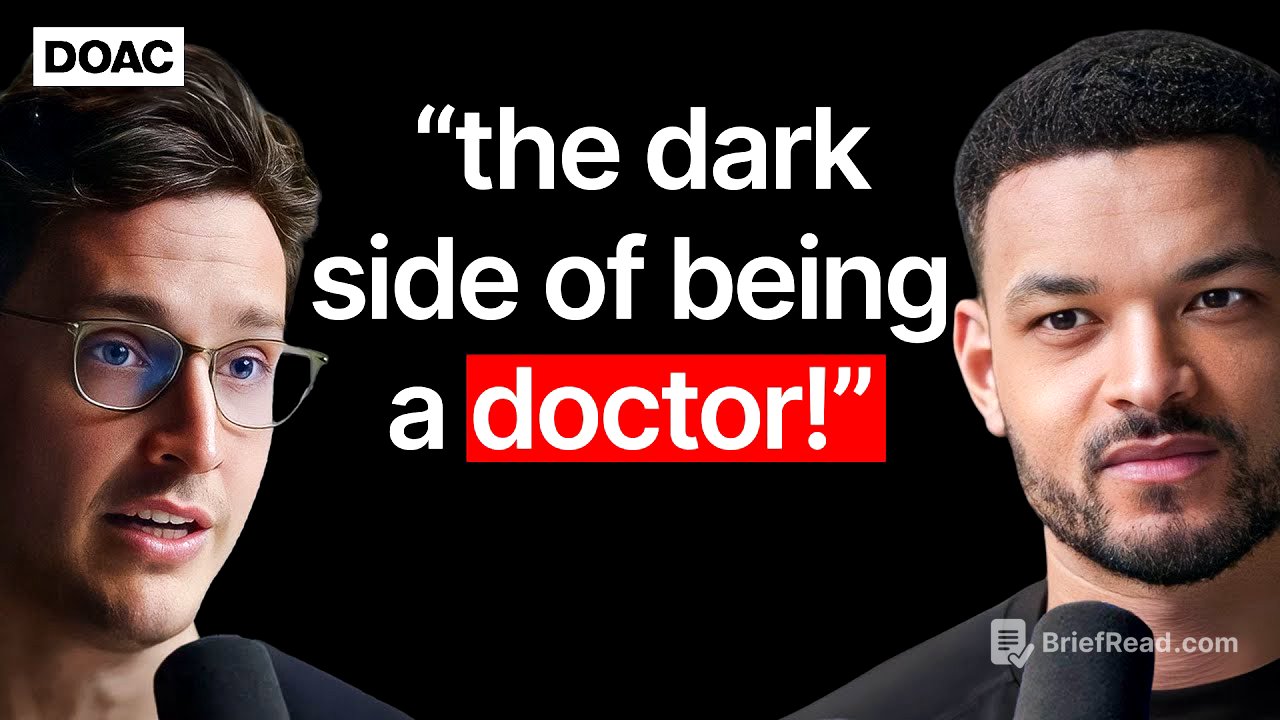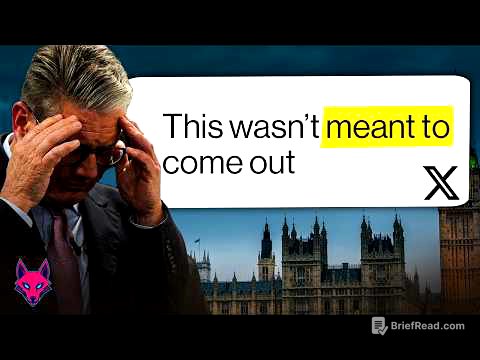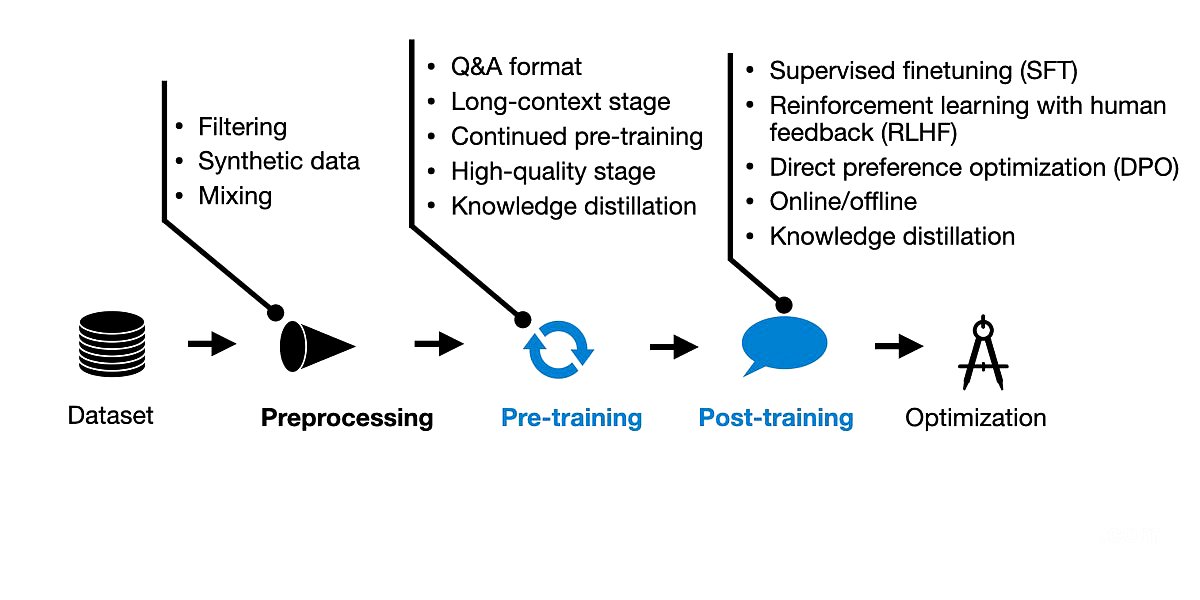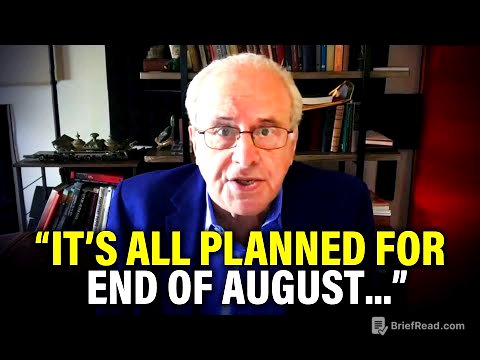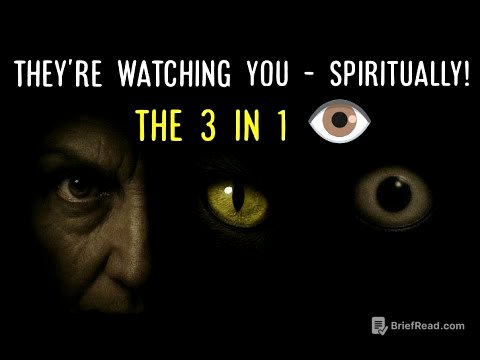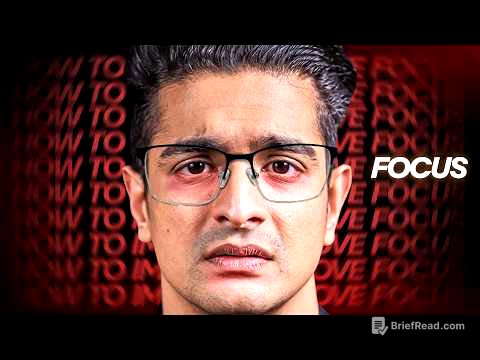TLDR;
Dr. Mike Varshavski discusses his mission to combat healthcare misinformation, emphasizing the importance of clear communication and evidence-based advice. He touches on various health topics, including weight loss, exercise, supplements, and the dangers of vaping, while also sharing personal experiences with grief and mental health. He advocates for a balanced approach to health, cautioning against extremes and the pursuit of perfection, and stresses the need for critical thinking and trust in reliable medical information.
- Combating healthcare misinformation
- Balanced approach to health
- Critical thinking and trust in reliable medical information
Helping People Make Better Health Decisions [2:15]
Dr. Mike's mission is to provide honest, transparent, and engaging health information to help people make informed decisions for themselves and their families. He realized the need for better communication in healthcare when he observed patients struggling to understand advice from top doctors. He noticed that people were being misled by TV physicians promoting quick fixes and false promises, which motivated him to counteract this misinformation. The COVID-19 pandemic highlighted this issue, with people turning to unreliable sources instead of experts like the CDC.
Why Have People Resonated With You And Your Approach To Spotting Disinformation [5:24]
Dr. Mike attributes his resonance with people to several factors, starting with his early adoption of Instagram, where he shared his medical journey to show that it's possible to have a balanced life while studying medicine. An article titled "You got check out this sexy doctor and his awesome dog" went viral, leading to numerous media requests. He used this attention to promote accurate health information, understanding that healthcare information can be boring if not presented engagingly. He studied marketing and sales techniques used by both commercial entities and those spreading misinformation, applying these principles to evidence-based medicine to make learning fun and accessible.
How Do You Check The Evidence Of The Studies You Share? [10:08]
When examining new research, Dr. Mike treats it differently than most media outlets or individuals. Instead of presenting a breakthrough study as the definitive answer, he applies the research to existing data and knowledge from his medical education to position it appropriately. He emphasizes that extremes are rarely correct in medicine, advocating for balance and homeostasis in the body.
The New Health Trends: Optimisation, Longevity, Anti-Ageing [12:10]
Dr. Mike acknowledges the emergence of optimization, longevity, and anti-aging trends, understanding their roots in scientific progress and the desire to solve the problem of mortality. However, he believes this field has been corrupted by capitalism, similar to health insurance and the pharmaceutical industry. He cautions against demanding specific treatments without expertise, noting that preliminary data from animal models or petri dishes are often sold as the next big thing. He stresses that science involves disproving hypotheses, not just supporting them, and criticizes the social media trend of only supporting agreeable information.
The Online Health Advice You Hate The Most [16:31]
Dr. Mike is most irritated by online health advice that creates certainty in an uncertain world, particularly in the "gray zone" where modern science lacks definitive answers. He notes that while weight loss used to be the primary area for such misinformation, anti-aging has now taken its place. He encourages celebrating experts who admit what they don't know and are actively working to find answers.
Lifestyle Changes Is The First Doctor's Advice [18:27]
Medical training emphasizes lifestyle modifications as the first step in treating chronic diseases like high blood pressure and diabetes. However, patients often prefer shortcuts like medication, even though there are trade-offs and side effects to everything. Dr. Mike stresses the importance of nuance in medicine, cautioning against villainizing treatments and recognizing that there is no one-size-fits-all solution.
Do Shortcuts Exist In Medicine? [20:24]
Dr. Mike firmly states that there are no shortcuts in healthcare, emphasizing that everything has side effects and trade-offs. He explains that even essential elements like hydration can be harmful in excess, and this principle applies to medications and supplements as well. He cautions against painting medicine with a broad brush, advocating for nuanced approaches tailored to individual needs.
What's Your Take On Calories In, Calories Out [21:13]
Dr. Mike explains that when advising a patient on weight loss, he considers their pre-existing conditions, past attempts, and available time and budget. He emphasizes that understanding a patient's previous dieting failures is crucial to providing effective recommendations.
How To Make A Diet Stick [23:12]
Dr. Mike identifies two key factors for a successful diet: its impact on weight (calories in, calories out) and its nutritional value. He warns against focusing solely on one aspect, as under-consuming calories without proper nutrition or overeating healthy foods can both lead to problems. The goal is to achieve a balance between caloric weight management and healthy nutritional intake, tailored to individual medical conditions and needs.
The Illusion Of A Good Body Equals Good Health [25:26]
Dr. Mike cautions against equating a good-looking body with good health, noting that appearance and weight alone don't provide the full picture. He criticizes the mindset of seeking shortcuts and hacks in healthcare, as these approaches often fail. He points out that those successful in business may be more susceptible to misinformation because the strategies that work in business don't apply to healthcare. He stresses that healthcare doesn't work well with extremes and that striving for perfection can be toxic, leading to anxiety and worry.
Calories In And Calories Out Does Work [29:06]
Dr. Mike clarifies that while the science of "calories in, calories out" works, its application can vary based on pre-existing conditions. He uses the example of blood pressure management to illustrate that while public health data shows controlling blood pressure lowers deaths, it's impossible to guarantee the outcome for an individual patient. He emphasizes that medicine involves doing the best with limited information.
The Benefits Of Exercising [31:09]
Dr. Mike emphasizes that exercise has numerous benefits beyond weight loss, including improved happiness, mood, social connections, strength, and decreased cancer risk. He recommends 150 minutes of moderate-intensity exercise per week, where speaking full sentences becomes difficult.
Where Is The Direction Of Travel With Our Health? [32:41]
Dr. Mike stresses the importance of teamwork between broad-view primary care physicians and single-point experts. He identifies two major problems in healthcare: the loss of trust in the healthcare world and a philosophical issue regarding processed foods and medications. He questions how hyper-medicated society is becoming and whether this trend will ultimately harm us.
What Would Happen If There Was A Deadlier Pandemic Than Covid [35:11]
Dr. Mike expresses concern about a potential pandemic that is significantly more deadly than COVID-19, particularly given the current loss of trust in healthcare. He notes that insidious misinformation can be more problematic than outright disinformation because it can lead to complacency and a failure to recognize the true extent of the harm.
Is Vaping Dangerous? [37:01]
Dr. Mike states that vaping is dangerous, especially for kids with developing frontal lobes, as they are more susceptible to addiction. He emphasizes that vaping should be used as a tool to quit cigarettes, not as a way to start using nicotine.
The Studies Around Vaping Side Effects [38:04]
Dr. Mike notes the existence of vaping-related lung injuries and technical problems with vaping devices. He clarifies that he's not trying to fearmonger but to explain that vaping can be problematic despite appearing less harmful than cigarettes. He also addresses the increasing prevalence of ADHD diagnoses, suggesting it may be due to heightened awareness or other factors. He respects individual autonomy in making health decisions, as long as the risks are understood.
The Real And Painful Reason Why I Started Boxing [41:47]
Dr. Mike explains that he chose boxing as an outlet after losing his mother to cancer. He emphasizes that boxing is not generally healthy but that the trade-off was worth it for him personally.
Losing My Mum [43:52]
Dr. Mike recounts the painful experience of losing his mother to an aggressive form of cancer, despite initially being told she was cured. He describes the emotional toll on his father and himself, noting that the experience taught him how life can be cruel and take things away quickly. He emphasizes the importance of bouncing back from adversity while still allowing oneself to feel emotions.
What's The Best Way To Heal From Grief? [49:27]
Dr. Mike shares that he moved in with his father after his mother's death and that they bonded over raising a dog. He advises those struggling with grief or sadness to take action, even something as simple as putting on shoes and going for a walk. He stresses the importance of seeking help from a medical professional and acknowledges that society is currently the most unnatural it has ever been for humans.
Your Journey With Mental Health & Social Media Bullying [52:09]
Dr. Mike discusses his mental health journey, particularly the challenges posed by social media. He notes that everyone is now a content creator and that even non-professional content can go viral, which can be overwhelming. He admits to being obsessed with checking social media for feedback, which led to tremendous anxiety. He emphasizes the importance of carving out moments to disconnect and avoid being in a constant state of fight or flight.
The Best Advice I Received From My Therapist [56:25]
Dr. Mike shares that his therapist advised him not to look at social media unless there was something valuable to gain from it. He now tries to approach social media with intention, using it to learn and improve himself. He also references Dr. Robert Waldinger's research on the different usages of social media, noting that passive consumption can be disheartening, while using it to form community and better oneself can have a positive impact.
Are Certain People More Prone To Get Addicted To Social Media? [58:15]
Dr. Mike believes that most people are prone to looking at negative comments on social media. He explains that he derives value from his work on social media because it helps him achieve his goal of being a useful and practical doctor. He views negative comments as a threat to that goal.
Have You Considered Quitting Social Media?? [59:32]
Dr. Mike has considered quitting social media but views it as a negative overall, as it provides an opportunity to help people. He wants to be valuable and useful, and social media is a tool to achieve that.
Are Vitamin Supplements Good For Us? [1:00:45]
Dr. Mike explains that while vitamins are essential, supplemental vitamins are generally unnecessary and are often sold by those preying on insecurities and promising shortcuts. He notes that the evidence for most supplements is lacking and that they can distract people from things that actually work.
Can We Get All Our Nutrients And Vitamins From Foods? [1:02:05]
Dr. Mike states that, unless there is a specific medical condition, all nutrients can be obtained from food. He warns that supplements can cause people to skip healthy behaviors, are often expensive, and can lead to people forgoing true medical treatments. He also notes that supplements have side effects and can interact with medications. He points out that supplements are not regulated and may not contain the ingredients listed on the label.
Do Prebiotics And Probiotics Work? [1:05:56]
Dr. Mike acknowledges the interconnectedness between gut microbiome and health but states that manipulating those bugs has not been proven effective in most ways that people promise. He recommends focusing on foods rich in fiber and avoiding unhealthy habits. He notes that tests to check the microbiome are too preliminary to recommend, as it's unclear what to do with the information.
We Should Listen To The Health Advice Our Grandmothers Told Us [1:07:39]
Dr. Mike emphasizes that the most effective health advice is often the same advice that grandmothers have been giving for generations. He notes that this advice is not always sexy but that it is what is known to work.
Mentioning Experts That Are Wrong [1:10:35]
Dr. Mike discusses the importance of having a good reason to disagree with public health standards and established science. He uses the example of Gary Brecka, who claims that headaches are caused by a lack of pink Himalayan sea salt, to illustrate how confidence can be a form of misinformation. He notes that science involves nuance and uncertainty, which is why people have lost trust in it.
People Are Losing Trust In Doctors Because Of This [1:13:06]
Dr. Mike acknowledges that doctors have sometimes been wrong and changed their minds on critical issues. He explains that people need to do the work to understand why doctors said what they said and why they are changing their minds now. He points out that while there are issues with the pharmaceutical industry, calling out failures and seeking to learn from them is a strength of Western medicine. He emphasizes that people should follow those who are open, transparent, and willing to explain why things are happening without 100% confidence.
Look After Your Children, We Need This Out Of Schools [1:20:48]
Dr. Mike shares his vision for redesigning society to be healthier, starting with getting phones out of schools. He believes that social media should be regulated like addictive substances, as it has limited benefits and many potential problems for young people.
Are You A Deep Thinker? [1:27:29]
Dr. Mike describes himself as introspective, constantly reviewing his actions and seeking to improve. He notes that this tendency can lead to anxiety if he feels he is not improving or progressing. He explains that cognitive behavioral therapy (CBT) can help challenge cognitive distortions and catastrophizing thoughts.
How Do You Deal With So Much Loss And Grief? [1:29:59]
Dr. Mike explains that he approaches difficult conversations with patients by presenting unbiased truth and empowering them to make the right choice. He emphasizes that healthcare is as much art as it is science and that two doctors can recommend different treatments without being wrong.
What Was Your Hardest Day? [1:31:21]
Dr. Mike says that there isn't a specific day that jumps out as the hardest, but that the cumulative effect of administrative work, limited time with patients, and the inability to fully help patients can be draining. He notes that it is frustrating when patients are deceived or influenced in a way that prevents them from going down the right path.
How To Save Someone's Life Doing CPR [1:36:13]
Dr. Mike explains the basics of CPR, emphasizing that the purpose is to buy time for first responders to arrive. He stresses the importance of calling for help first and then pushing hard and fast in the center of the chest. He notes that CPR is only for those who are unconscious, not breathing, and pulseless. He also emphasizes how hard one has to push down on the chest.
I Asked The Doctors To Stop Doing CPR On My Mother [1:43:43]
Dr. Mike shares that he has been involved in CPR situations lasting double digits of minutes for young patients, as they have a greater opportunity to heal. He recounts his experience calling off CPR on his mother and the flashback he experienced during a patient simulation. He also shares his reaction to seeing medical professionals laughing after a patient's family passed away, noting that he had to remind himself that they are people too.
Last Guest Question [1:45:49]
Dr. Mike reflects on his social isolation and loneliness after losing his mother, wishing he had reached out for support or created conversations with his classmates. He feels that this has significantly impacted the number of friendships he carries to this day and that it was a missed opportunity. He admits to feeling lonely sometimes, which he attributes to society and his work.
